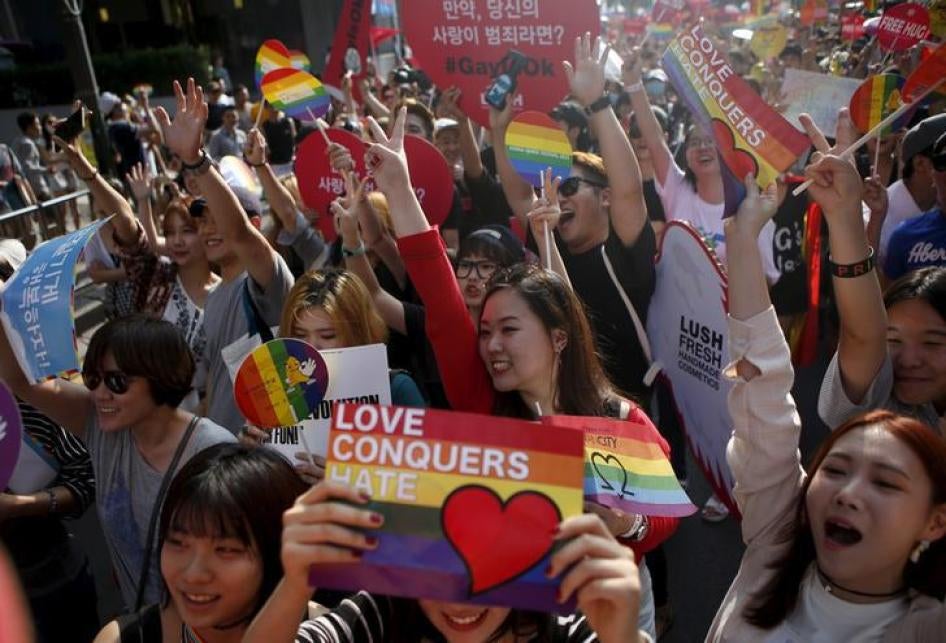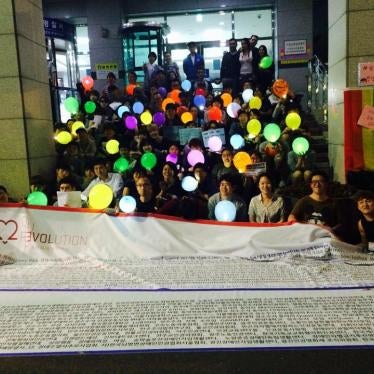(New York, August 4, 2017) – South Korea’s Supreme Court has ordered the government to allow a lesbian, gay, bisexual, and transgender (LGBT) rights foundation to legally register as a charity, ending three years of the foundation’s leaders facing discriminatory rejection from multiple government agencies. The judgment affirms South Korea’s obligations to respect freedom of assembly for all its citizens, Human Rights Watch said.
“The South Korean Supreme Court has affirmed the Beyond the Rainbow Foundation’s right to register with the Ministry of Justice,” said Graeme Reid, director of the lesbian, gay, bisexual, and transgender rights program at Human Rights Watch. “This judgment is a victory for the fundamental rights of all South Koreans – and a boost to the LGBT community’s ability to organize and advocate.”
The foundation raises funds to support the LGBT rights movement in South Korea. It documents discrimination against LGBT people, advocates for their rights, and aims to make civic space safer for LGBT people and their families. Denying official registration to the foundation curtailed the group’s ability to receive tax-deductible donations and operate in full compliance with the law.
The registration system for nongovernmental groups in South Korea is decentralized, requiring groups to register with the most relevant agency. Since the rights of LGBT people do not fall clearly under any government agency’s specific mandate, the agencies were able to send the Beyond the Rainbow Foundation from one place to another. While nongovernmental groups that are already registered for other purposes can carry out projects on LGBT rights, only one cultural group that already had some LGBT projects has been able to register.
The government’s resistance to registering the Beyond the Rainbow Foundation came in three stages. First, there was an informal push-back when the group approached the Seoul Metropolitan Government in 2014. That same year, there was a similar refusal from the National Human Rights Commission. Finally, the Ministry of Justice rejected their formal application for registration in April 2015. Each agency claimed that LGBT rights were not within their purview.
In rejecting their application, the Ministry of Justice made the most stinging remarks, saying: “The Ministry of Justice develops, oversees and revises policies related to all human rights issues in South Korea … [But] since your foundation’s main objective is promoting human rights for a social minority, it is different in nature from the organizations that the ministry allows to incorporate.”
The foundation appealed this rejection in the Seoul Metropolitan Court, and they won in March 2017, at which point the Ministry of Justice appealed the judgment to the Seoul High Court and then the Supreme Court.
“It should never have been necessary for an LGBT group to lobby to find a government agency to consider their application for registration,” said Reid. “The Beyond the Rainbow Foundation has been put through a three-year long game of political ping-pong and it is past time to let them do their important work.”
South Korea’s government has consistently voted to support measures at the United Nations that call for an end to discrimination against LGBT people, but it has failed to uphold those principles at home. In 2014, Seoul’s mayor canceled the enactment of a city human rights charter after religious groups opposed the inclusion of sexual orientation in a non-discrimination clause.
In recent years, activists have had to fight bureaucratic battles to hold an annual pride gathering. And the government has rolled out a new sex education curriculum with no mention of homosexuality because, education officials said, it needed to maintain “value neutrality regarding society, culture and religion.” In April 2017, the military ran a vicious crackdown on suspected gay service members.
“This judgment should signal to all agencies across the South Korean government that LGBT Koreans’ basic rights should be protected like everyone else’s,” Reid said.






